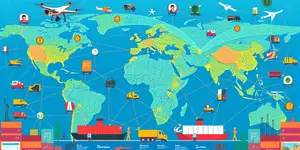
In an era defined by connectivity, the way we exchange value is undergoing a profound transformation. Digital wallets are no longer just a convenience—they are spearheading a revolution in cross-border finance, empowering individuals and businesses to transcend traditional barriers. As global commerce accelerates, these wallets are emerging as the catalysts for a fairer, faster, and more inclusive financial world.
By 2025, the cross-border digital payments market is expected to exceed a staggering $4 trillion, and transaction volume is projected to grow at a 15% annual rate through 2030. Such figures underscore a monumental shift in how money moves around the world. From bustling markets in Mumbai to tech hubs in Shanghai, consumers and merchants are embracing near-real-time transfers and transparency over legacy banking rails.
Behind this explosion lies a convergence of factors: surging e-commerce, increased migration, and a collective demand for cost-effective, reliable payment channels. Today’s digital wallets cater to an array of use cases—peer-to-peer remittances, cross-border bill payments, global investment platforms, and even superapp ecosystems that blend social and financial services into one unified interface.
Traditional cross-border payments often carry fees of 3–7% of transaction value and settlement times of three to five business days. In contrast, digital wallets streamline processes, reducing fees and supporting instant global settlements with minimal intermediaries. The impact on everyday users is profound: families sending remittances, entrepreneurs sourcing supplies abroad, and freelancers receiving payments in foreign currencies all benefit from these efficiencies.
Perhaps most transformative is the role wallets play in financial inclusion. In regions once dominated by cash, such as parts of Africa and Southeast Asia, mobile money solutions have enabled millions to access banking services for the first time. The rise of mobile wallets like M-Pesa in Kenya or UPI in India demonstrates how digital platforms can become lifelines, offering savings, microloans, and micro-insurance to previously underserved populations.
Asia-Pacific stands at the forefront of wallet adoption, led by powerhouses like Alipay, WeChat Pay, and India’s UPI. In these markets, wallets have become deeply embedded in daily life, handling everything from grocery purchases to investment deals. In contrast, Europe and North America are experiencing steady but slower growth, hindered by entrenched credit card usage and stringent banking regulations.
Meanwhile, Africa and parts of South Asia are leapfrogging legacy banking infrastructure through mobile-first wallet solutions. By offering mobile money solutions driving inclusion, these platforms are transforming informal economies into digitally connected networks, opening new pathways for entrepreneurship and economic empowerment.
Technological advancements are propelling wallets from simple payment tools to comprehensive financial ecosystems. Blockchain integration enhances security and transparency, while API-driven platforms enable real-time settlement and interoperability. Strategic partnerships between fintech firms, telecom operators, and legacy payment networks are forging new corridors for cross-border money movement.
Despite remarkable progress, several obstacles remain. Interoperability between wallet providers and across jurisdictions is limited, creating silos that hinder seamless transactions. Regulatory complexities—spanning KYC/AML compliance, consumer protection, and data privacy—vary widely from region to region, slowing global expansion.
Traditional financial institutions have yet to fully embrace wallet integration, leaving a gap that fintech startups and telecom-backed ecosystems eagerly exploit. Trust and security concerns also persist, particularly in regions where digital literacy is still developing. Overcoming these challenges will require collaboration, standardization, and a shared commitment to user-centric solutions.
As cross-border commerce and migration continue to grow, digital wallets will play an ever more central role in global finance. The future promises greater regulatory harmony, universal wallet-to-wallet connectivity, and the proliferation of superapp-driven financial ecosystems worldwide. Banks, fintechs, and telecoms must work together to build an inclusive, resilient infrastructure that serves both individuals and enterprises.
Ultimately, cross-border digital wallets are more than a payment innovation—they represent a paradigm shift toward a world where financial services are instantaneous, borderless, and accessible to all. By championing open standards, fostering collaboration, and prioritizing user trust, the industry can unlock a future where every person, regardless of location or income, can participate fully in the global economy.
In this journey, each transaction becomes a testament to human connectivity, powering dreams, opportunities, and progress across every corner of the world. Digital wallets are not just redefining fintech—they are redefining our shared future.
References













